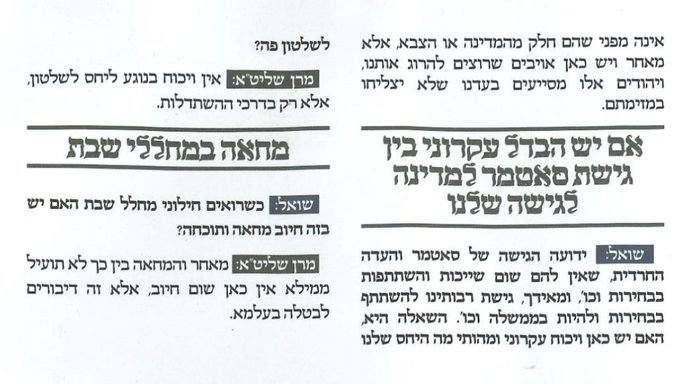
This week, a striking statement from Rav Moshe Hillel Hirsch, co-leader of the Charedi Litvishe world alongside Rav Dov Landau, was published in the Slabodka Torah Weekly.
Rav Hirsch asserted that there is no ideological dispute between the mainstream Charedi community and the Satmar faction regarding their stance toward the State of Israel. The only difference, he explained, lies in the practical approach—what he referred to as “hishtadlus.”
This declaration caught many by surprise. Rav Hirsch, known for his fluency in English and his nuanced communication style, is often perceived as more moderate in his views. Yet his statement suggests a deeper ideological alignment with Satmar than many had assumed.
When asked directly whether there was any ideological divergence between the Litvishe and Satmar perspectives on the Jewish state, Rav Hirsch responded unequivocally:
“There isn’t any difference between our approach towards the Jewish State and Satmar—it’s only in hishtadlus.”
This raises serious questions. The Satmar approach is well known for its uncompromising opposition to Zionism. At a recent rally in New York City, Satmar representatives reiterated their call for the “total eradication of the Zionist regime,” going so far as to compare the Jewish state unfavorably to Nazi Germany and blame it for all suffering inflicted upon Jews worldwide.
Such rhetoric echoes the language used by pro-Hamas demonstrators and other extreme anti-Israel movements. If Rav Hirsch’s statement is to be taken at face value, it suggests that the ideological foundation of the Litvishe Charedi world may be closer to Satmar than previously understood—differing only in tone and tactical engagement.
This revelation invites a broader conversation within the Charedi world and beyond.
What does it mean for Jewish unity when leading rabbinic voices express sympathy with ideologies that reject the legitimacy of the Jewish state? The only Jewish State and home for close to 8 million Jews! And how should the wider Jewish community respond when such views are amplified on global platforms?
In a time of rising antisemitism and increasing polarization, clarity and courage are needed more than ever. The Jewish people must grapple with these internal tensions while striving to uphold truth, unity, and mutual respect.


8 comments:
If anything, this makes the Satmars look better. They're honest. We hate Israel. We wish Israel was gone!
And the Litvish? Israel, give us our money! Hand over those cheques. {And we hate you}
Did r hirsch really say this? How do we know that the one answering is rav hirsch you’ve inky posted a small clipping you have the full page?
The Rosh yeshiva was not aware of the over the top terminology released Sunday by Satmar’s goyishe PR firm. DIN & his fellow Charedi bashing travelers know it’s a lie to lump Rav Hirsch in with that
This is a weekly column in which Rav Hirsch answers Halachic questions; everyone in Israel is very familiar with this Slabodka Sheet!
6:47
You are being motzei shem ra on Rav Hirsch, implying that Rav Hirsch basically doesn't know the Satmar SHIT"ah, every speaker on that rally reiterated that what they are saying is straight out of VaYoel Moshe!
Of course he knows the shita of Rav Yoelish. What he couldn’t have known yet are the new twists that the PR firm added on Sunday. Even Dov Hikind said he could live with Satmar just sticking to the original shita to not recognize the medina
Can you please post the whole page?
1:59
I am not going to give them any more publicity than this despicable Q&A
Post a Comment